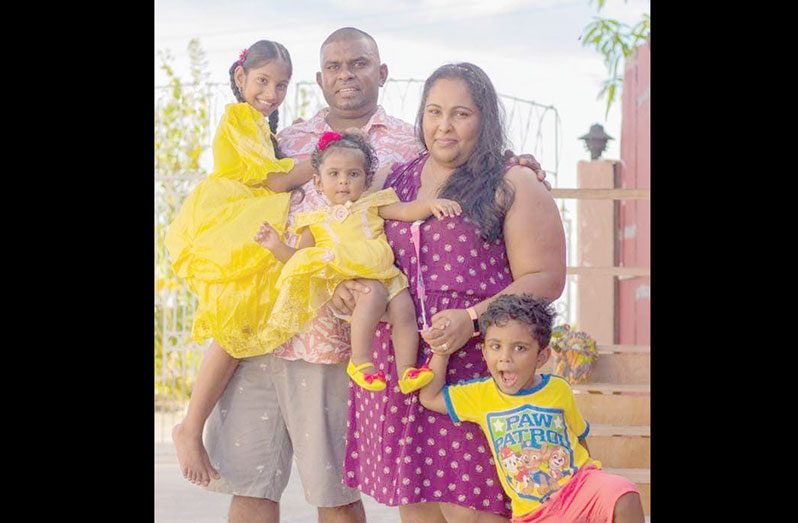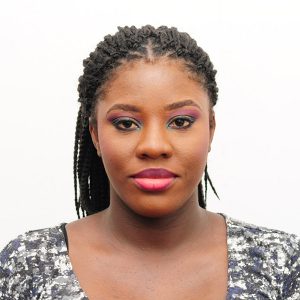-parents focusing heavily on giving her a ‘normal life’
ELEVEN-YEAR-OLD Suhanna Singh may be a special needs child but over the years her parents, Kavita and Ajay Singh, have tried their best to give her as normal a life as possible, and show the world that she can be just as competent as any other child.
This is why her family is overjoyed that she was able to write her National Grade Six Assessment (NGSA) and gain a place at a secondary school despite having cerebral palsy.
Hailing from the community of Columbia in Mahaicony, Suhanna was one of eight pupils who wrote the secondary school placement exam at the Carlton Hall Primary School. She was able to gain a total of 408 marks and earned a place at the Mahaicony Secondary.
“I felt that she did exceptionally well given her challenges and I am so happy for her,” commented her father, Ajay.
Though she can be a bit shy sometimes, Suhanna’s parents described her as a bubbly child who loves to read, play with puzzles, go on drives and referee basketball games between her little brother and her dad. She is the first of three siblings.
She developed the condition as a result of being born prematurely.
“She was born at 26 weeks of gestational age, so she was not fully developed and had a host of difficulties,” her mother Kavita shared.
“She is a Grade Three cerebral palsy, according to the grading of cerebral palsy, meaning she is still able to have some level of functioning. Our aim is to get her to at least a level two for her to be fully independent,” she further explained.
Cerebral palsy is a disorder that affects movement and muscle tone or posture. It’s caused by damage that occurs to the immature brain as it develops, most often before birth. People with cerebral palsy can have problems swallowing and commonly have eye muscle imbalance. They also might have reduced range of motion in various joints of their bodies due to muscle stiffness. Some people show normal or near-normal intellectual capabilities.
But being born different has never deterred Kavita and her husband from wanting the best for their first born child or seeing that she has a lot of potential.
“I knew that if we push her and demand from her, she can lead a normal life. Early on in life we knew she was smart. She would always teach herself. She could read; it was just that she couldn’t write. We made it our goal to ensure we do as much as we can so that she can have the best life she can have with her condition,” Kavita said.
But as is the case with children with special needs, things were not always easy. And for Suhanna and her family that was particularly the case when it came to her education. It was easier for the family in the earlier years but would become much more difficult as Suhanna advanced through primary school.
“We had gotten her enrolled at a play group. That was our first kind of encouragement. It was totally accommodating. The owner and teachers of the school loved her so much. They would come to pick her up [and] take her back home. Everything was good and then came the time to go to primary school,” Kavita explained.
Due to the need for Suhanna to develop her writing skills, she remained in nursery school for a few extra years before she entered primary school at the Grade Three level.
However, the family said it was an uphill task getting teachers to understand that Suhanna could be just as normal as other students in her class.
“When she went into Grade Three that was where there was this mentality where people treated her differently. We started being proactive and would pop in unexpectedly at school. One day we dropped in and stood outside of her classroom looking at what was happening. We saw all the other children had a reading book and were doing reading but she was never given a reading book and mind you she is a fluent reader. We started asking her things and she said that is how it is every day. We started becoming very worried,” Kavita shared.
She also noted that Suhanna would also start coming home with injuries from school, which led to the special needs department of the Ministry of Education (MoE) in the region getting involved.
But never giving up on wanting a normal life for their daughter, and wanting her to have an education, when the pandemic began and school closed to face-to-face learning, the parents eventually began to home school their daughter.
“We never saw her as an inferior person nor would we ever,” Kavita said.
“We just let her have her normal life and take time off to talk to her. And She knows it’s not a choice she has to continue her education.”
Given all the challenges they have had to face over the years to be able to still see Suhanna perform at her NGSA examinations was a proud moment for the family.
“Whatever she did, I’m happy because she made the effort,” Kavita said.












